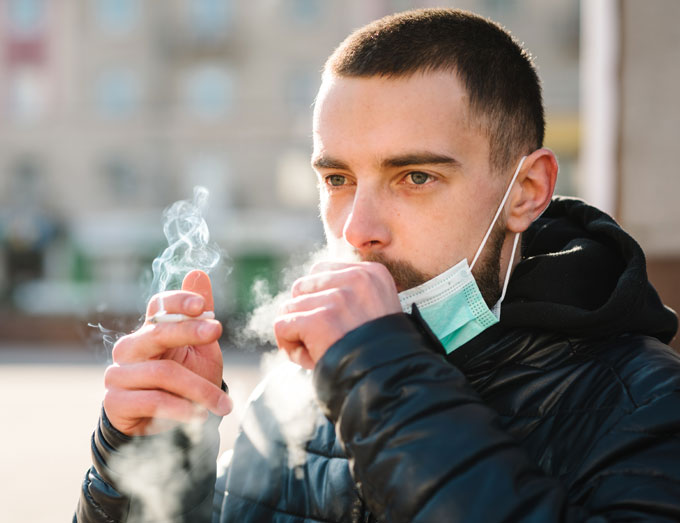
Tobacco smoking has been identified as a major risk factor for developing COVID-19 and complications that may arise as a result, with risks not just associated with damage to the lungs from smoking, but viral transmission from hand to mouth during the act of smoking itself.1
Additionally, we know that second-hand smoke increases the risk of acute respiratory infections.2
Therefore, the World Health Organization urges people to stop smoking tobacco to minimize the risks associated with the current coronavirus pandemic in both people who smoke and those exposed to second-hand smoke.1
This information may feel alarming and anxiety inducing for people who currently smoke, however, there are evidence-based ways to increase the chances of successfully quitting.
For many people quitting isn’t easy; however, there are a number of reviews evaluating interventions to help people to stop smoking.
Evidence suggests that people who smoke should use a combination of ‘stop smoking medicines’ and behavioral support to give them the best chances of success.[3]
(Hear what smokers should know about COVID-19, from Dr. Neal Patel, Pulmonary and Critical Care Medicine at the Mayo Clinic. Courtesy of the Mayo Clinic and YouTube. Posted on Mar 24, 2020.)
Cochrane has created a Special Collection of existing Cochrane Systematic Reviews that summarize evidence for people wishing to give up smoking and for those helping them to give up.
The Cochrane Reviews focus on interventions that are feasible under public health measures that restrict face to face contact with health practitioners.
Given the risks of smoking during this pandemic, it is important to provide information that will help people to maximize their chances of success.
The Cochrane Special Collection, COVID-19: Effective options for quitting smoking during the pandemic, includes Cochrane Reviews on nicotine replacement, behavioral support such as telephone, internet and text messaging programs, and gradual quitting.
Many people are making great sacrifices to #StayHome & protect their health & that of others from #COVID19.
Here some ideas to stay healthy:
🏃♀️Be active
🥕Eat healthy
🚭Don’t smoke
🧘♀️Meditate
📚Read booksJoin the new @WHO challenge & show us what you do to be #HealthyAtHome! pic.twitter.com/f9adab39Ci
— World Health Organization (WHO) (@WHO) April 2, 2020
This is one of several Special Collections relevant to COVID-19, other recently published collections include evidence relevant to critical care and infection control and prevention measures.
“There is a wealth of evidence on the best ways to stop smoking,” explains Cochrane author, Jamie Hartmann-Boyce, from Nuffield Department of Primary Care Health Sciences, University of Oxford in the UK.

“The evidence suggests people who smoke should use a combination of stop smoking medicines and behavioral support to give them the best chances of success.”3
“Options may be limited at this time, but there are ways to boost chances of quitting smoking that don’t involve face-to-face contact or prescriptions.”
“This Special Collection pulls together the evidence Cochrane has on this topic, to help health professionals advise people and for quitters to use to inform their own decisions.”

“Anxiety and depression improve as a result of quitting smoking,4 so there is good reason to hang on in there when the going gets tough in trying to give up,” added Nicola Lindson, also from the Nuffield Department of Primary Care Health Sciences, University of Oxford, UK.
“If one method doesn’t work, don’t be discouraged – evidence shows some people need to try to quit many times before successfully doing so.”
“Just because you haven’t been able to quit smoking before, doesn’t mean you won’t be able to now.”

“Cochrane is helping to build up the evidence base for those healthcare workers and policymakers working on the COVID-19 global response,” according to Cochrane Editor in Chief, Karla Soares-Weiser.
“We have a series of Special Collections being produced and shared with global decision makers.”
“Smoking during the pandemic is associated with risks of contracting coronavirus and complications arising from it.”
“This Collection is particularly helpful for people looking to give up smoking and those helping others to give up.”
For freely available reviews related to the coronavirus visit Cochrane’s COVID-19 Resources page.
Additional research is available on Wiley’s COVID-19 Hub.
(Learn More about Cochrane, a global independent network of researchers, professionals, patients, carers and people interested in health. In this short film we introduce you to Cochrane’s work producing credible, accessible health evidence. Courtesy of Cochrane and YouTube. Posted on Jun 20, 2019.)















